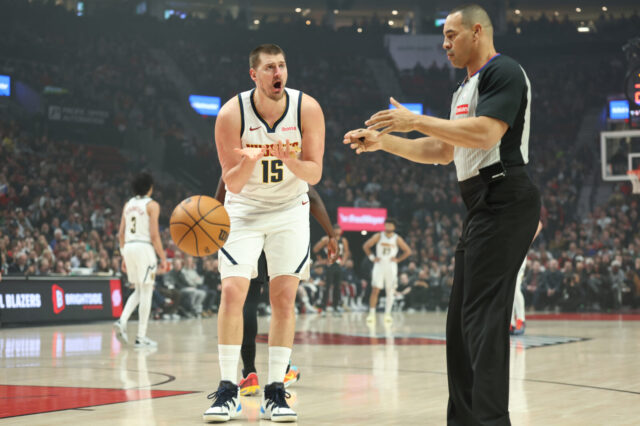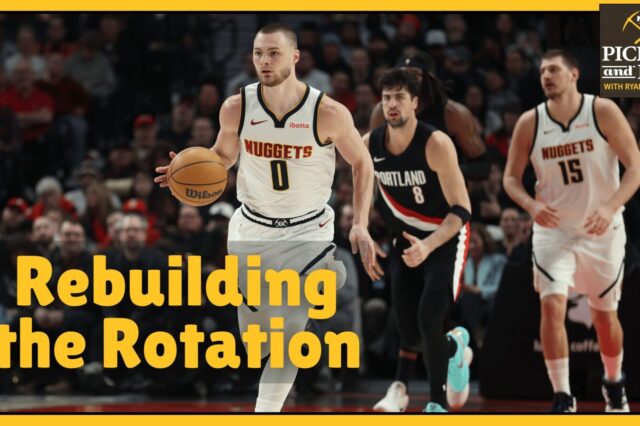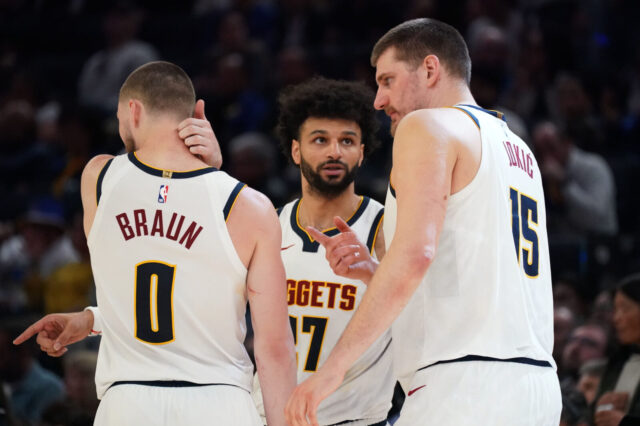As the Denver Nuggets limp toward a second-straight lousy, playoff-less finish, the focus is on Thursday’s trades and future changes to a dysfunctional roster, a head coach that can’t seem to get his players on board with what he wants to do and the idea of “tanking” to get a higher draft pick this summer. If the Nuggets could only land a budding superstar like Jahlil Okafor from Duke, all would be right in the world.
Really? We are actually counting on luck of the ping-pong balls to turn around this franchise? That’s our best hope?
What happens if the Nuggets get a nice lottery pick, say the No. 5 overall, and he turns out to be the next Nikoloz Tskitishvili? Does that mean another (insert number here) years of darkness?
Those who support the tanking theory believe that Denver is a basketball wasteland whose only hope is to land a high draft pick to build around. Only having a guy like Okafor, or Karl-Anthony Towns from Kentucky, as a captive cornerstone will allow the Nuggets to attract difference-making free agent players to turn around the fortunes of the franchise. That’s because, according to this misguided theory, the city/region can’t attract premier free agents because: A) It’s cold here during the winter (despite numerous 65-plus degree days in recent weeks) and B) with the predominance of African-American players in the league, the fact that there’s a relatively small African-American population makes Denver uninviting. It seems the “club scene” isn’t up to snuff here in the old west. (This ignores the fact that African-American players also make up the majority of NFL rosters, and Denver is seen as a premier destination for NFL free agents, and that football plays many games outdoors in the cold weather.)
If you subscribe to this theory, you’ve been brainwashed. First of all, if any free agent cites those two reasons for not wanting to play in Denver, he is absolutely not a player you want on your team in the first place. That guy brings along a losers mentality.
This theory also takes responsibility for the fortunes of the team completely off of ownership and management, as if they don’t even matter. It’s all about having superstar players.
Someone forgot to mention that to Gregg Popovich, R. C. Buford and the San Antonio Spurs. You know, the mid-market NBA franchise that has won five NBA titles in the last two decades, including a beat down of the star-studded Miami Heat last season? Yep, those Spurs.
Whenever you bring up the success of the Spurs and the possibility of trying to model their success, you get the same, “Oh, they’re the exception” reply. My question is simple: Why? Why does the “exception that proves the rule” have to be an exception? Aren’t all NBA franchises operating under the same rules and guidelines? What’s to stop any other franchise from trying to operate their club just like the Spurs do?
It’s simple really. San Antonio stays at or near the top of the league year in and year out because they have the best organization, not the best roster. The name on the front of the jersey stays the same. Many of the names on the back change year to year. And they’ve still won five rings.
Starting out, I was not a fan of Popovich. A former assistant coach who had never been a head man, Popovich was named general manager of the San Antonio Spurs in 1994. Early in the 1996 season, when the team was without its best player, David Robinson due to injury, Popovich fired head coach Bob Hill and replaced him with… himself. At the time, it was a move that smacked of pure arrogance. In retrospect and five NBA titles later, it was genius.
Sure, he got lucky being able to draft Tim Duncan after that disastrous first injury-riddled season on the bench. Sure, it was good fortune that Duncan had the character to have stayed in college for four years and was already elite-level NBA ready as a rookie.
But good fortune favors the bold, they say. It has not been by chance or luck that the Spurs have been the model NBA franchise for most of the past two decades. Popovich gave way to Buford as general manager in 2002, acknowledging that the organization is more than a one-man show. Together, they’ve made countless shrewd and calculated personnel moves along the way – never choosing to “tank” during a “down” turn (the Spurs are on an NBA-record run of 17 consecutive winning seasons) but rather making acquisitions – such as the draft day trade in 2011 that netted them 2014 NBA Finals MVP Kawhi Leonard (who had been Indiana’s first-round pick at No. 15) to rebuild the roster on the fly.
They’ve brought in only players that fit their “team-first” style of play physically and mentally. The superstars they have had, including Robinson, Duncan, Tony Parker and Manu Ginobili have all bought in to the team-first concept and relinquished their star status, personal stats (and sometimes even higher salaries) for the good of the team. This doesn’t happen by accident. It’s built in to the culture of the franchise from the top on down. Buy in if you want a shot at a ring.
I’ve interviewed Coach Pop once, and because the topic was his beloved Air Force Academy (he graduated from AFA in 1970 and served as an assistant coach for six seasons), he was accommodating and easy to work with. (You don’t hear that much from the guys that cover him on a regular basis; “no nonsense” is an understatement when it comes to Popovich.) What I’d love to have asked him and didn’t – although chances are very slim he’d share any information – is what’s his secret? How has he turned a mid-market organization into the model every NBA franchise should aspire to be? Is there a secret recipe, or is it as simple as hiring and working with the right people who all share a singular purpose?
The Atlanta Hawks evidently sought the same answer because when they had a coaching vacancy after last season, they snatched up former long-time Spurs assistant coach Mike Budenholzer to try to bring the San Antonio way to Atlanta. The results have been spectacular.
The Hawks have a roster without a true superstar. They play team-oriented basketball and have the NBA’s second best record, having already won more than 40 games at the All-Star break. They are seen as one of the favorites to unseat the Spurs this June.
So is there any real reason why the Denver Nuggets should not try to emulate the San Antonio Spurs? Any reason at all? Anyone? Anyone?
Okay, so there’s no reason for the Nuggets not to “tank” and lose as many games as possible the rest of this season in order to get a better draft position. But in long-term reality, when has “tanking” led to winning down the road? Doesn’t it seem like the same dysfunctional outfits are wrapped up in the tank talk every year?
The answer to what ails the Nuggets is to go out and find the next Gregg Popovich, hand him control of the franchise and get out of his way.
“Mr. Kroenke, Chauncey Billups is on line one…”



